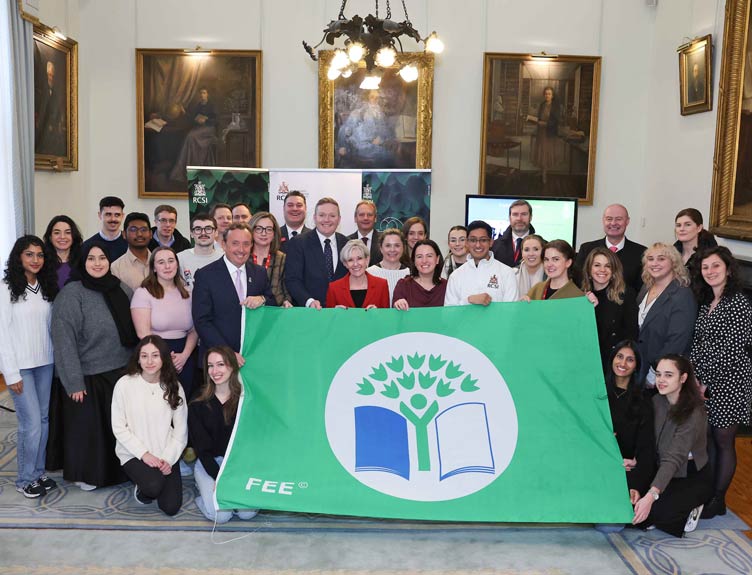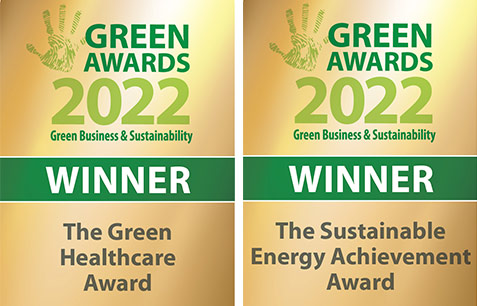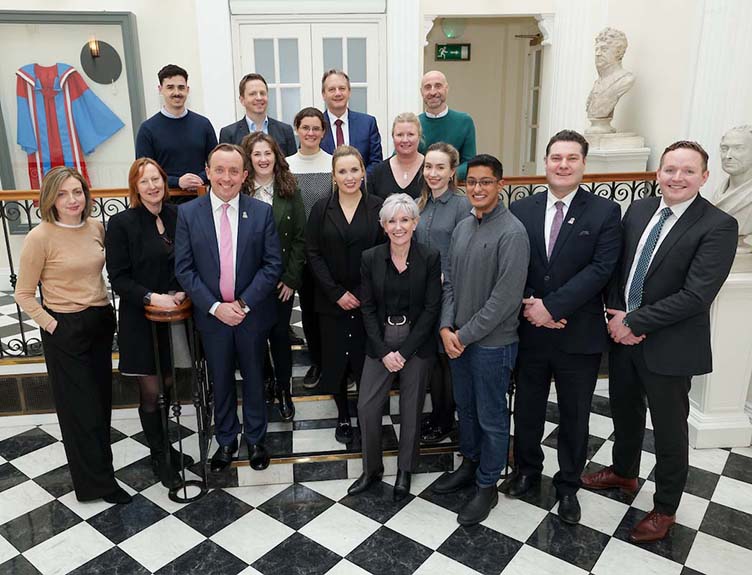Green Campus initiative
The RCSI Green Campus initiative is aimed at enhancing sustainability on campus. Both staff and students have worked to reduce our carbon footprint by integrating efficient energy use, reducing waste and increasing recycling, while enhancing biodiversity throughout our campuses.
To date, the RCSI Green Campus committee has introduced a variety of initiatives across the areas of biodiversity, waste management, and energy efficiency that have succeeded in reducing gas consumption at our campuses by 40%, improving energy efficiency by 38%, significantly reducing the use of reusable coffee cups across campus and the successful use of harvested rainwater in its toilets.
Some of our most relevant projects in the area include:
- 'Zero to Landfill' policy for waste
- Eliminated paper cups from RCSI staff rooms saving over 200,000 cups/3.5 tonnes of waste
- ‘Love My Space Campaign’ to support staff and student awareness of initiatives across campus
- Introduction of discounts for using keep cups and a 30c levy for not using reusable cups
- All take away food packaging on campus is compostable
- RCSI's energy is 100% renewal with energy efficiency measures built into planned maintenance and capital projects
- 38% increase in energy efficiency since 2016 despite campus footprint increasing by 4% due to college expansion over the same period
Green Flag
As a result of our efforts, we obtained a second successive Green Flag by An Taisce’s Green Campus programme in 2025, which demonstrates a long-term commitment to sustainability and the continued involvement of our campus community.
The Green Campus programme works to encourage higher education institutions to take an integrated approach to environmental action, education, and management. It motivates these institutions to incorporate sustainability initiatives into all areas of campus life and encourages both students and staff to be more environmentally conscious.

Green Awards
We have also been recognised for our commitment to sustainability with the 2022 Best Green Campus Award at the annual Education Awards. The Education Awards recognise, encourage and celebrate excellence in the third level education sector on the island of Ireland.

This award highlights our commitment to making a positive environmental impact and contributing to a sustainable future, which we achieve by managing resources efficiently and supporting environmental causes aligned with the UN’s Sustainable Development Goals.
We also won the Green Healthcare Award and the Sustainable Energy Achievement Award at the 2022 Green Awards. The Green Awards recognise the extraordinary contribution and commitment that companies now make towards growing a greener future in Irish business today.
- Working towards industry best practice and energy consumption run-rates.
- Continually improving energy-efficiency through a blend of technology and people-based projects via liaison with the IT Department and contractors on ongoing building/construction projects.
- The procurement of green energy for all future tenders to new and existing sites.
- Reducing electricity consumption on campus by 2-3% through the continued roll-out of an energy awareness campaign aimed at changing behaviour in all campus buildings.
- Introducing energy-efficient lighting for all new refurbishments and replacing existing lighting at all sites.
- Continuing to raise awareness of Green Campus in general and energy conservation in particular through regular announcements to staff and students on energy saving habits in the workplace and University environment.
- Introducing an out-of-term closure of tutorial rooms to maximise energy-saving.
- Continuing staff and student engagement with RCSI ‘green’ areas with activities to promote biodiversity in these spaces.
- Continuing greening of urban campus sites.
- Increasing the awareness and importance of biodiversity among students, staff and the greater community in general.
- Continuing to foster existing biodiversity initiatives in the Foundation Year Curriculum (i.e. Research Summer School) and collaboration with the student Environmental Society.
- The introduction of a zero landfill policy for all waste disposal.
- Encouraging and supporting student- and staff-led waste initiatives, particularly in shared buildings through interactive pop-up stands.
- Engaging with vendors to promote best practice for recycling among the RCSI community by bringing their expertise to on-campus events.
- Using updated data from waste reporting to highlight improvements and areas for continued attention.
RCSI was an early signatory to the UN Principles of Responsible Investment (PRI) and is committed to environmental, societal and governance (ESG) reporting standards.
- Responsible investment principles suited to a healthcare education, not-for-profit institution. This means we align to principles of environmental, social and governance (ESG) by applying ethical considerations when making investments, including not investing in fossil fuels, tobacco or armaments. By becoming a signatory to the internationally-recognised Principles for Responsible Investment our organisation publically demonstrates our commitment to including ESG factors in investment decision-making, risk management and asset ownership.
- RCSI as sponsor employer, has supported its pension schemes in becoming signatories to the Principles of Responsible Investment (PRI). In fact the RCSI Defined Benefit Pension scheme was the first Irish pension fund to sign up to the United Nations supported PRI principles, followed more recently by the RCSI Defined Contribution scheme. The trustees incorporate these principles in investment decision-making and its investment portfolio continues to exclude tobacco, fossil fuels, nuclear and conventional weapons.
- A key piece of PRI’s work is on climate change and in our asset stewardship it continues to be highlighted as a key ESG focus. PRI has also developed an inevitable policy response (IPR) programme: 'As the effects of climate change begin to affect everything from food production to migration and national security, governments will at some point be forced to take action – and the longer the delay, the more abrupt, forceful and disruptive that policy response will be. Our IPR work will model the impact of that response for investors, corporates and regulators'.
- In compliance with the Public Health (Tobacco) Act 2002, the Public Health (Tobacco) (Amendment) Act 2004 and the Public Health (Tobacco) (Amendment) Act 2009, RCSI is a smoke free campus.
RCSI is privileged to have a deep professional responsibility to enhance human health, which is intertwined with planetary health.
This Climate Action Roadmap will help us navigate the challenges ahead all the while supporting our core mission to ‘Educate, Nurture and Discover for the Benefit of Human Health’.
RCSI’s Green Campus committee comprises volunteer staff members and students, with every effort made to ensure that the committee is as representative of the campus community as possible.
We are committed to:
- Giving full consideration to the sustainable use of resources in all of its management decisions.
- Raising awareness of environmental matters generally, and encouraging understanding and responsibility in the use of resources within its community and amongst those with which it interacts.
- Consulting appropriately on issues of environmental concern.
- Researching environmental issues through RCSI's academic departments and units.
- Acknowledging its commitment to environmental responsibility through education for sustainability and sustainable resource management.
- Communicating this policy to agencies providing services to RCSI and parties undertaking work on behalf of the University.

RCSI’s Sustainability and Climate Health Committee was established to integrate sustainability seamlessly into the fabric of our education programmes, research, engagement and operational activities, ensuring a balance between the well-being of our community, the advancement of medical knowledge, and the preservation of our planet.
The Committee is comprised of key stakeholders from across the organisation including Senior Management Team (SMT), Estate and Support Services, International Engagement, the Insights and Planning Office, IT, Communications, Finance, Human Resources, school department heads and the student body.
Abi Kelly, Director of International Engagement and External Relations, is the Climate and Sustainability Champion on SMT. In this role Abi has fostered a sustainability mindset among SMT colleagues, influencing decision-making processes and ensuring that sustainability goals are seamlessly integrated into the fabric of the University.
SMT ensures reporting on the University’s progress towards a sustainable future through regular updates and comprehensive reports, ensuring accountability and maintaining trust in our community.
